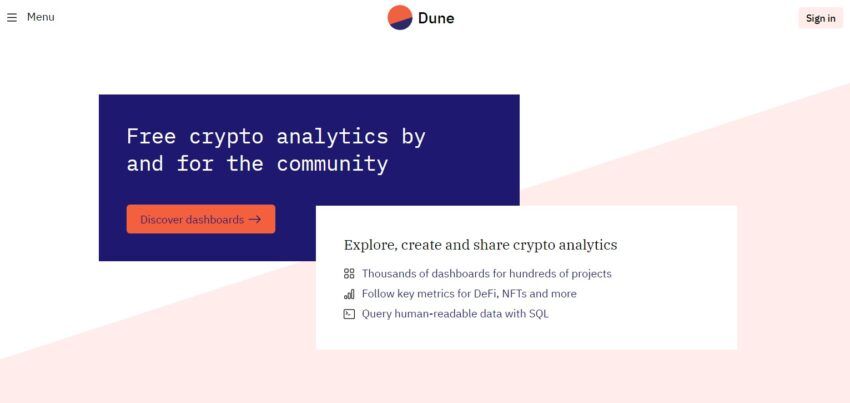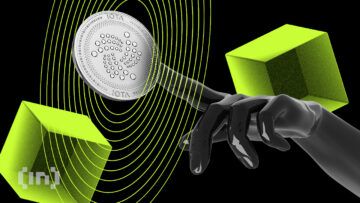What is Dune Analytics, the company that earned the unicorn status only three short years after its creation?
In this fast-paced world of crypto, investors, analysts, and crypto enthusiasts are starting to drown in a sea of data. But luckily, Dune Analytics, now known as just Dune, offers a free tool that everyone has been looking for — a tool to let users get the exact blockchain data they need.
We explain what Dune Analytics is here, along with how it works.
In this guide:
What is Dune Analytics?

Dune Analytics is a data platform that crypto-asset analysts and investors use to research specific projects such as NFTs, DeFi platforms, or blockchain ecosystems. Anyone can query the data and create visualizations using Dune.
The platform currently supports data from Ethereum — including layer-2 solutions such as Polygon, Optimism — Binance Smart Chain, and Gnosis Chain.
Dune Analytics was created with the express purpose of making Web 3.0 data available to all. Dune Analytics allows anyone to publish and gain access to crypto trends in real-time. It is a community-based open-source data provider, and it is freely available, so anyone can access and publish data without registering or paying.
What Dune Analytics brings new to the crypto world is the fact that it makes on-chain crypto data available and consumable. Initially, the creators intended to create a tool that allowed anyone with an internet connection to analyze a few dozen smart contracts products.
The service’s name, Dune, comes from the fact that their data charts look like dunes, and it is also related to Frank Herbert’s science fiction novel, Dune. It recently rebranded from Dune Analytics to just Dune.
The team behind Dune Analytics
Founded in 2018, Dune Analytics was launched in 2019 in Oslo, Norway, by Fredrik Haga and Mats Olsen.
Fredrik Haga has an impressive background. He got his master’s degree in economics from the Norges Handelshøyskole (NHH) in Oslo in 2016. Haga also participated in two exchange programs at the University of California, Berkeley, in 2016 and the University of Sydney, Australia, in 2013.
Dune’s co-founders were working at the same company in Norway, and they both decided to quit their jobs to create the data analytics platform.
Although the company was initially set up to work on Ethereum data, it was only a small business with a few paying customers for months. They struggled to get funding for months before Binance stepped forward.
In Aug. 2020, the team received $2 million during the seed round. The platform became popular among those who were able to achieve insane percentage yields using experimental finance protocols in 2020.
In Nov. 2021, Dune Analytics raised over $69 million during the Series B round. The team intends to use these funds to continue to grow and help educate and empower blockchain analysts.
What makes Dune Analytics unique?

Dune Analytics is a community-driven initiative. The data can be re-used and is available to anyone. What makes Dune Analytics unique is that the platform doesn’t offer data sets for specific projects like other companies. Instead, Dune Analytics allows anyone to query complex data, and it offers the tools to do so.
Dune’s lively community includes traders, analysts, enthusiasts, and others who share their data analysis with everyone. The data is reusable and mixed to suit any user’s needs, which is why it is sometimes referred to as the GitHub for blockchain data analytics.
Dune has replaced its closed, standard, and costly counterparts with open dashboards. The dashboards provided by Dune Analytics make it easy to understand and visualize complex data with simple-to-understand graphs and charts.
The dashboards you generate with Dune Analytics are postable anywhere on the web, including on your personal website. And most importantly, anyone can use the Dune platform for free. Anyone can also use the dashboards posted on the platform for their own data sets.
You can use search queries to find information on something as diverse and popular as the NFT collections purchased by top traders on OpenSea. You can also use it to find data about niches, such as Ethereum Name Service domains. There are many queries that can track multiple data sets. If you don’t see one, you can create it.
How do you use Dune Analytics?
Anyone can use Dune Analytics by creating an account and using any of the popular Dashboards on the Discover tab. You see these dashboards under the “Discover” tab, and you can search for data using the search bar. You can search for the name of the protocol, token, or even the username who created the dashboard.
Data is displayed in lists or visualized into graphs and bar charts. If you can’t find a query you want, you can create one. However, there are some limitations to what you can find.
Dashboards on Dune Analytics
To view any of the listed dashboards, you need to click on the dashboard to view it. Dune does not store any blockchain state data. It only displays the Structured Query Language query results that were requested the last time Dune was accessed.
You can get more info by hovering over the charts. All queries automatically update when you view them. Note that refreshing can take some time, and you’ll be added to a queue. Your data may be out of date by as little as a few minutes to hours.
Although most of the features offered by Dune Analytics are free, it also offers a paid subscription.
The Dune Pro subscription costs $390 per month, per user. Premium users can skip the query queue to run parallel queries. Dashboards and queries are kept private, and data is exported to CSV files.
Writing new queries and creating dashboards
If you wish, you can create your own SQL queries on the Dune Analytics platform.
To create a new query, you can do so by clicking on “New Query.” Note that you will need to create a free account on the Dune Analytics platform to enable new query creation.
Firstly, you have to select the database for your query (Ethereum, Gnosis Chain, Polygon, Optimism OBM 1.0, Optimism OVM 2.0, BNB Smart Chain, and Dune Engine V2).
Using Dune Analytics for NFTs
Dune Analytics is a great platform that can be very useful for crypto companies and anyone looking for blockchain data because it allows anyone to query, extract, and visualize tons of data from the blockchain. It is a powerful tool that anyone who loves to work with data needs to perform analysis for DeFi projects and NFTs. You will find many OpenSea dashboards on the platform.
Here are some examples of the most popular dashboards for NFTs:
- OpenSea Top Trader Stats by @mtitus6 (Top Traders – Recent Purchases, OpenSea – Top 50 Traders)
- NFT Sales Data OpenSea by @cryptuschrist (Volume, Sales, and Median Price, Top NFT Collections by Volume)
- OpenSea Data @pancakephd (Active Users, NFTs Sold, Volume, OpenSea Volume Per Use)
- NFT Market Overview by @sealaunch (OpenSea Volume and Transactions, Trending NFT Projects, NFT Market Volume per Day on Ethereum)
Dune Analytics offers a clear view into the market
The world of blockchain and everything in it is expanding at a rapid pace. That’s why we now need tools to help us better understand why and how DeFi protocols are evolving the way they are. Although on-chain data may not be able to help with trading or observing short-term trends, a tool such as Dune Analytics can be very powerful for uncovering macro trends.
It will quickly give you a feel for whether the market has gone into a bear or bull market, or give you answers regarding volumes and big shifts in trends. This could also help you to identify when things are overheating.
With so much information available, you should focus on making the most out of it. The fact that you can create SQL queries on multiple networks adds to the potency. Learn to do this, and soon you’ll have a much greater understanding of the market.
Dune Analytics can be intimidating to a new user, which is why the BeInCrypto Telegram group might be the right place to go. Join the friendly community and learn how to use Dune Analytics, among other things.
Frequently asked questions
What is Dune Analytics?
Dune Analytics is an open-source, Ethereum-based crypto data analytics platform, that offers free on-chain data to anyone. It can run its SQL queries directly on the supported blockchains (Polygon, Optimism, Binance Smart Chain, and Optimism and Gnosis Chain).
Is Dune Analytics free?
Dune Analytics is a free blockchain data analytics platform that can be used by anyone to determine macro trends on any of the supported blockchains. The platform also offers a paid subscription ($390 per month), which gives users the option to keep their dashboards private and enables them to run up to six queries at the same time.
What language is Dune Analytics supporting?
Dune Analytics supports standard PostgreSQL query language. Even new and non-technical individuals will be able to make some basic queries, without having to learn SQL. However, the easiest way to use Dune Analytics is to search and use dashboards created by other users.
What is Dune Analytics used for?
Dune Analytics, or simply Dune, is an on-chain data platform that provides crypto analysts extensive data on any given individual crypto project, certain crypto spaces such as NFTs or DeFi, or blockchain ecosystems. Anyone can use, share or create new queries on the Dune platform.
Where is Dune Analytics based?
Dune Analytics is based in Oslo, Norway, where the two co-founders are located.


